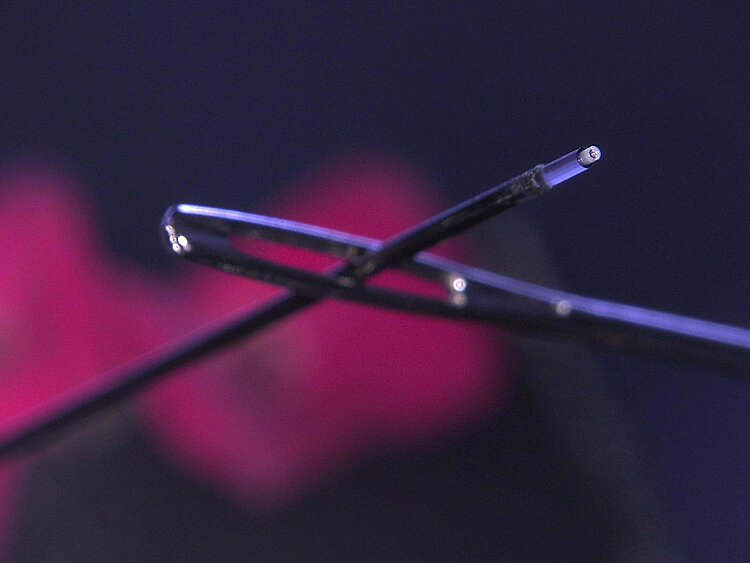3D printing offers completely new design and application possibilities in many areas. Scientists working on the HYAZINTH research project (BW Foundation) have developed a special 3D method that allows complex micro-optics, including apertures or other components, to be printed in a single step. This 3D microfabrication technology can be used to manufacture micro-endoscopes, for example. These miniaturized optics with a diameter of only 125 micrometers enable endoscopic examinations of plaque in coronary vessels or in the carotid artery, for instance. Endoscopes manufactured in this way provide a higher degree of resolution and a larger opening angle than endoscopes using an alternative technology.
Scientists at the University of Stuttgart have been exploring and developing this flexible method for producing complex, miniaturized imaging systems using 3D multiphoton lithography for several years. It was only in the summer of 2016 that another project funded by the German Federal Ministry of Education and Research was launched at the University of Stuttgart. Together with the company Nanoscribe, scientists from the 4th Physics Institute and the Institute of Technical Optics at the University of Stuttgart developed the method for manufacturing micro-optics in 2.5D as well as complex 3D composite structures and hybrid optics.
The inventors now want to use their knowledge to start-up an enterprise. The researchers of the "Printoptics" start-up project are able to manufacture components at a scale of 10 µm to 2 mm and on a variety of substrates, such as optical fiber tips, image sensors or LEDs. The team led by Dr. Simon Thiele and Nils Fahrbach can not only design and optimize optical components and systems in the submillimeter range, but also manufacture them. These new optics are already being used in numerous industries such as medical technology, measurement technology and the semiconductor industry, as well as by research institutes and facilities.
The researchers point to the major advantage of this 3D printing technology which lies in the fact that the cost of individual optical components does not scale directly with the complexity of the design. In addition, completely new types of optics can now be developed for special applications that used to be disproportionately expensive or even infeasible.
The start-up project is managed at the University of Stuttgart by Prof. Dr. Alois Herkommer, Professor at the Institute of Technical Optics, and Prof. Dr. Harald Giessen, Director of the 4th Physics Institute. It was funded by Baden-Württemberg’s EXIST Start-up Grant and its support program for Young Innovators. The Baden-Württemberg Foundation is also supporting the project through the OPTERIAL research program. TLB GmbH has been in charge of the patent management.
After a minor change in the company’s name, Printoptix GmbH i.G. is currently being set up in order to grow its business as an independent limited liability company (GmbH) from next year onwards.


